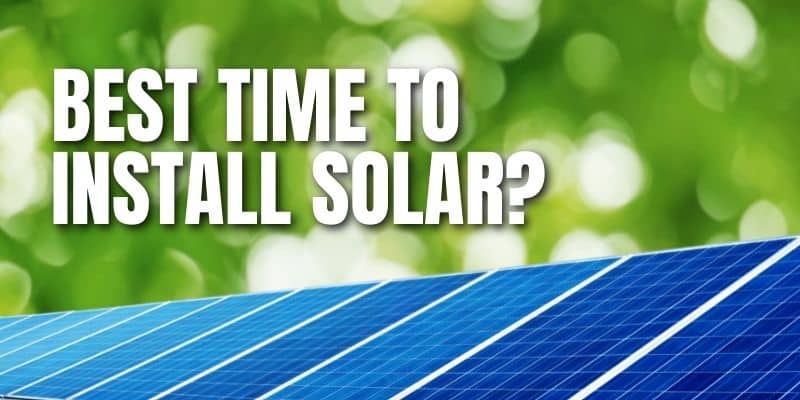When is the best time for the installation of solar panels? While summer may bring soaring temperatures and an abundance of sun, it doesn’t necessarily mean that it’s the best time to make the switch to solar.
In fact, the low-peak season, particularly in the months leading up to summer, might be the perfect time to start exploring your options – and here’s why!

Solar panels need sunlight, not heat
Solar power is generated through either solar photovoltaic (PV) or solar thermal systems. Solar thermal, as the name implies, takes advantage of the sun’s heat to produce steam. However, most rooftop solar panels in Australia are photovoltaic — they transform sunlight into electricity.
Solar systems work best when the sun is shining and there’s no denying that the days are longer on average in summer than other seasons. The angle of the sun, coupled with the strength of the sun’s radiation, means that some solar systems can generate twice the electricity in summer, than in the shorter days of winter.
However, as solar PV panels utilise light rather than heat, the higher temperatures of summer don’t necessarily correlate to higher yields for your solar panels. In fact, rather than boosting the performance of solar panels, very hot days may actually have a negative impact on your solar panels’ ability to generate power. An overheated panel won’t be an efficient panel.
They say that where there is life, there is hope. Well, in the solar industry, we say that where there is light, there is solar. In Australia, we’re fortunate to experience periods of sunny weather year round with solar generation output steadily climbing from mid-August, peaking around December.
In fact, Australia is one of the sunniest countries in the world, with many big cities that get fewer than 90 days of overcast weather. Our sunniest state is Western Australia, followed closely by Northern Territory, South Australia and Queensland. On average, no matter which time of year it is, Australia receives around eight hours of sunlight per day. That means there are plenty of opportunities for you to harness its power!

Lower demand = better solar deals and faster installations
It doesn’t take an industry expert to know that summer is big business for solar. Solar companies boost advertising spend and Australians are suddenly lining up to make the switch.
For this reason, installing solar during low peak season can result in more affordable prices and quicker turnaround times for installations. As demand for installations increases, so too does the likelihood that you’ll be faced with inflated costs and lengthy installation wait times.
By installing your system at a less-popular time of year such as autumn, winter or early spring, you’ll take the pressure off installers and be able to enjoy significant savings. Instead of waiting for your installation to be completed, you can start reaping the benefits right away.
Start summer solar-ready
Installing solar panels in low peak season also means you’re set up to harness the sun’s energy when sunshine hours increase during summer. Long before winter makes its way back in and spring is just a possibility on the horizon, you could have solar panels up and running generating clean energy for your home.
If you’re keen to start seeing great returns straight away, consider installing in spring. Spring is actually the second best time for solar energy production, with summer obviously taking out first place.
During spring, Australia gets on average around 12 hours of sunlight. This gives your panels more than sufficient time to soak up the sun’s rays with the added benefits of better solar deals and faster installation times just before summer.
There’s never a ‘bad’ time to install solar
While installing in low peak season is the perfect way to get ahead of high demand and receive great value for your dollar, there’s isn’t really a ‘bad’ time to install solar. With average annual savings on your electricity bill upwards of 30%, you can’t really go wrong. In fact, waiting for the ‘right time’ to install solar is a false economy and just means you’re missing out on real, proven savings in the meantime.
Remember, a solar system will, on average, give you 20+ years of service. You will ride the highs and lows of the seasons for many years, well beyond your payback period.
What season you install your system in is really negligible in the big picture. Take heart in knowing that regardless of WHEN you make the investment, you will be making a GOOD investment.
Ready to start slashing your electricity bills and take advantage of low peak season benefits?
Energy Matters makes going solar simple! Receive up to 3 FREE, obligation-free quotes from trusted local installers – it’ll only take you a few minutes! Y
You can also call us on 1800 EMATTERS or email our friendly team for expert, obligation-free advice.












































